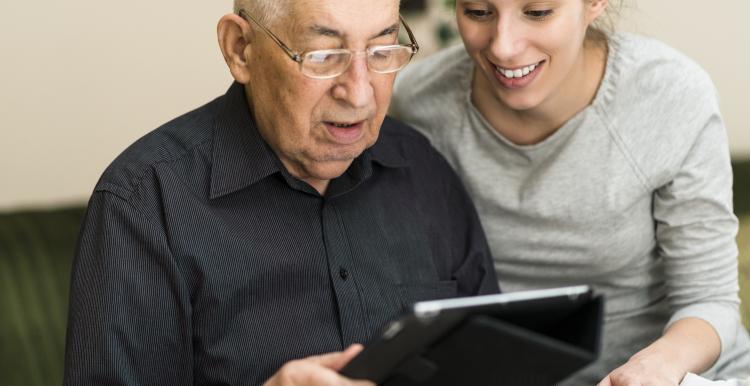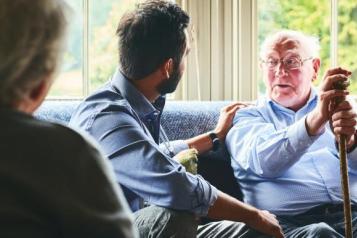Shining a light on the struggles surrounding social care

The aim of this work was to put a face to unmet need so that people can hear the real stories behind the statistics. To do this, we wanted to collect a set of case studies that will show people who are overlooked or underserved by the current social care system, and the impact this has on their lives. The project was part of a national campaign, and we wanted to make sure that the voice of Salford was included. You can read some of the other case studies collected by other Healthwatch across the country here.
Below is one of the case studies we heard from here in Salford.
Dawn's story - “At some point I know it's gonna crash and burn- it's so much to juggle.”
Dawn is trying to juggle working as a teacher and caring for her mother-in-law, Joyce, who has just had to move in with them 4 days before this interview, which is when Joyce’s care package broke down. Dawn isn’t new to caring and has been doing Joyce’s shopping and laundry etc for several years, which amounted to a few hours each week, but the amount of care has now snowballed.
Joyce is 88 and vulnerable. She has dementia, is housebound with mobility issues, is profoundly deaf, needs medication for arthritis, and help with personal care and household chores. Following hospitalisation after a fall, a care package was put in place at the start of the pandemic which included 4 visits from a domiciliary care agency each day.
After many months of dealing with care workers who either didn’t turn up, didn’t follow the care plan, or just didn’t write up their notes, a safeguarding concern was raised by Dawn and Paramedics last February, and she installed cameras to see what was happening in Joyce’s flat when the care workers visited.
If that's the quality of care when there's a camera in the house, what is the quality care like when there's not a camera in the house? I'm thinking it's not just about Joyce, it's about everybody else in Salford who hasn't got somebody watching out for them who is being neglected. And the people that should be looking after them, which is Social Care, aren't looking after them.
Joyce has always refused to consider going into residential care, so Dawn felt that they had no choice but to move her in with them, and is now relying on Dawn’s own mum to visit morning and lunchtime to care for Joyce. Dawn provides the care as soon as she gets back from work.
The implications of being a carer – “She’s never gonna leave this house now”
With the move still fresh, the implications of what this is going to mean long-term are just beginning to hit Dawn. She has now escalated from providing 48 hours of care per week, to 14 hours of care each day.
Because of the pandemic, Dawn hasn’t been going out much apart from work, so being a carer isn’t going to change that. But there are also practical implications to consider, and Dawn is wondering what adaptations she is going to need to make around the house to make it safe for Joyce. She had already started planning for this several months ago and asked Social Care services for advice, but was refused as Dawn’s home wasn’t classed as Joyce’s primary residence.
In the meantime, Joyce continues to fall, and Dawn and her husband are having to lift her, so Dawn sometimes sleeps on the settee in case she falls in the night. They are also trying to work out how and where they can install an accessible shower room, and for the time being they are giving Joyce bed baths.
Lack of a break - “I think we’ve gotta wait for her to die”
In most employment you get annual leave – but that’s not necessarily true when you are a carer. One area where Dawn can already foresee a big change to her life is the ability to go away on holiday.
Carers are eligible for a carer’s assessment, and a carer’s health check to make sure they stay healthy and have the support they need to carry out their caring role. However, after 5 years of caring Dawn still hasn’t been offered these. These checks are important because carers can find it hard to put their own health needs first, and indeed Dawn has had to miss her own medical appointments on at least one occasion in order to provide cover for a missed visit by the care agency.
Despite this, only once in the past 9 months have any of the various agencies expressed concern for Dawn’s own wellbeing.
They said “You know you really need to look after yourself”, but I thought you know what? That's the first time any of you have actually said one thing to me, and that's only because I've actually highlighted to you that because you're not doing your job… I'm now under pressure… but that's not part of their duty of care.”
Following the safeguarding incident, the onus was put on Dawn to provide extensive evidence and a timeline to go into a report for the Care Quality Commission – something that many unpaid carers would have neither the energy nor the organisational skills to carry out, and this created yet more pressure.
Does this all sound too familiar?
We're here to listen to the issues that really matter to local communities and hear about your experiences of using health and social care services.


